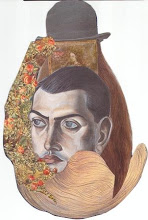skip to main |
skip to sidebar
Back to Delphi (Book Review)
Viv Koleva is a terse and focused greek widow in her fifties. She lives in Athens and cares for the elderly in a hospice capacity. Her son is in prison but has been granted a five day leave to visit with his mother. Both mother and son seem unsure how to relate as they make their way around ancient ruins at a resort in Delphi and simultaneously skirt the remains of their shattered lives and relationship.
Back to Delphi is a searingly intimate portrait of these two ruined individuals. One a criminal with no future. The other a criminal's mother with little to no insight into her child's mental or emotional being. We are introduced to them as they prepare for their excursion and then see their tension and uncertainty with one another. From there we are taken back and shown their entire lives. Viv's silent and lonely childhood in a remote village, "I know she was there. I just don't recall her being there," her mother says long after she is grown and has a child of her own. We see her uncertain courtship and marriage to the eventual father of her son. The father's alcoholism and Viv's pathological need to keep her son silent and out of the way so as to keep peace in the home. And finally her son, Linus's, stunted and remote emotional development into a man who just might kill to sate a sense of hollow self loathing.
Written by Ionna Karystiani, Back to Delphi, has been translated into English from its original Greek by Konstantine Matsoukas. The shift from the idiosyncratic and highly idiomatic Greek language into the equally particular English makes for some untidy rhythms and slight lapses in coherence when it comes to metaphor and imagistic language. But the intent is never obscured and there is an insistent beauty in Karystiani's relentless exposure of her characters' sense of bewilderment. These are complex emotional characters caught in turbulent events that might tempt any author into the purplest of prose. Karystiani however avoids the pitfalls of grandiloquence by keeping her similes and metaphor earthy and tied very much to a sense experience of reality. It is to the writer's credit that her characters' abstract musings ultimately flesh out the reader's concrete sense of experience and place. And by taking us through 50 years of Greek cultural history with the above mentioned sense of texture and detail, Back to Delphi not only provides an intimate picture of two sympathetic but deeply flawed people but also opens a window in on a culture and way of life that makes this English version a very exciting find.



No comments:
Post a Comment